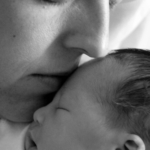It has been postulated that psychological stress in the mother, if present at a critical time of brain development, can permanently alter a child’s response to stress and may have long-term negative consequences. In response to stress, blood flow to the uterus is restricted and the fetus receives fewer nutrients, which may result in lower birth weight. Several studies have demonstrated an association between maternal stress and low birth weight, and it is felt that low birth weight is a marker for stressful intrauterine conditions.
Exposure to various stressors during the prenatal period may also lead to hormonal changes, and there is concern that when the developing fetus is exposed over a prolonged period of time to elevated levels of stress hormones, such as cortisol, permanent changes in the child’s stress response mechanism may occur. Animal studies have indicated that prenatal stress is associated with long-term disturbance in hypothalamic-pituitary-adrenal (HPA) axis function, and there is now some evidence in humans to support this hypothesis.
A recent study indicated that exposure to prenatal maternal anxiety predicted higher levels of cortisol in children 10 years of age. It has yet to be elucidated how these increases in cortisol secretion may affect a child’s response to stress and subsequent vulnerability to mood or anxiety disorders.
In a recently published longitudinal study, Ian Colman of the University of Alberta and colleagues in Britain followed a group of 5362 individuals born in 1946, who were assessed on 21 occasions until the age of 53. Data on mood and anxiety symptoms were gathered at ages 13, 15, 36, 43 and 53.
The study found that those with lower birth weights were more likely to have worse outcomes in terms of vulnerability to mood and anxiety symptoms. There also appeared to be a dose-response effect: the lower the birth weight, the more likely an individual would suffer from a mood disorder later in life. In addition, there was an association between early delays in motor development and later courses of depressive or anxious symptoms.
Although this study didn’t assess maternal stress during the pregnancy, lower birth weight was used as proxy for the adverse events to which the fetus is exposed during development. While low birth weight may be a marker for maternal stress, there are many other factors which contribute to low birth weight. The authors emphasize that not all small babies will experience poor mental health in the future; rather, these findings underscore the belief that conditions in the womb have an important effect on a child’s future development.
Snezana Milanovic, MD, MSc
Colman I, Ploubidis GB, Wadsworth ME, Jones PB, Croudace TJ. A longitudinal typology of symptoms of depression and anxiety over the life course. Biol Psychiatry 2007; 62(11):1265-71.
O‘Connor TG, Ben-Shlomo Y, Heron J, Golding J, et al. Prenatal anxiety predicts individual differences in cortisol in pre-adolescent children. Biol Psychiatry 2005; 58: 211-217.
Weinstock M. Alterations induced by gestational stress in brain morphology and behaviour of the offspring. Prog Neurobiol 2001; 65: 427-451
Click here to read more about psychiatric disorders during pregnancy.








Leave A Comment